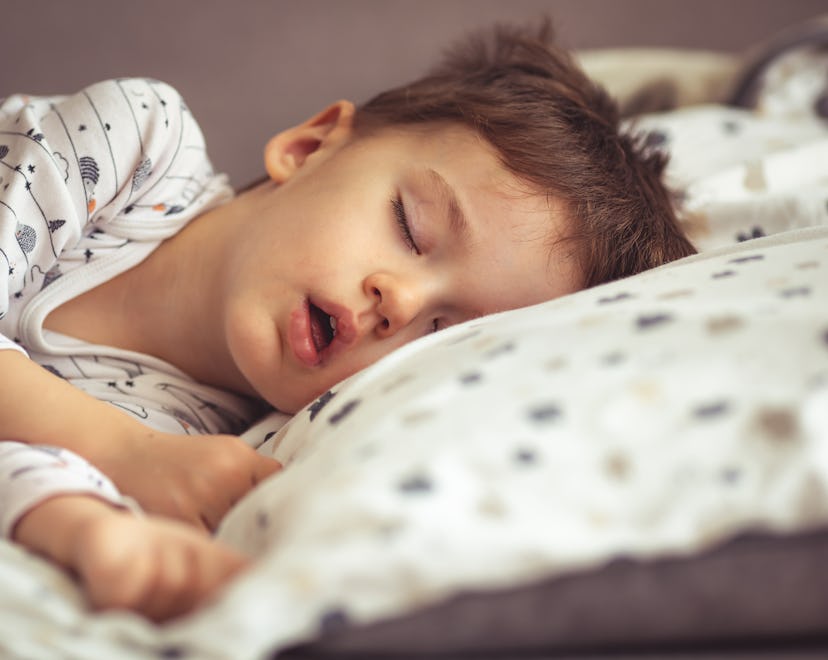Sleep

Should You Be Giving Your Toddler Melatonin To Help Them Sleep?
We asked experts if it’s effective and, most importantly, safe.
Many adults are increasingly using melatonin to improve sleeping, with few adverse effects. So when their kids are bouncing off the walls at bedtime, frustrated parents may wonder whether melatonin can be given to toddlers to sleep better.
While there are few known seriously adverse effects from melatonin, medical experts recommend exhausting the non-medical sleep strategies first. And no one recommends melatonin for children under the age of 3. But the allure of a chewable gummy that solves the battle of bedtime and gives mom and dad a blissful interruption-free evening is strong, so we asked three doctors to walk us through how safe and effective melatonin is for toddlers.
What is melatonin exactly?
Our body produces the hormone melatonin naturally at nighttime and it helps us to regulate our circadian rhythms and sleep cycles, says Dr. Kelly Johnson-Arbor, MD, a medical toxicologist and co-medical director for the National Capital Poison Center. “Because of its beneficial effects on sleep, many people take melatonin for treatment of insomnia, jet lag, and other sleep problems,” she says. Since melatonin is sold as a dietary supplement and not a drug, however, it is not regulated by the U.S. Food and Drug Administration, and the exact dose needed to improve sleep quality is not defined, she added.
Produced in either natural or synthetic form, melatonin comes in pill, liquid and chewable-gummy form. Natural melatonin supplements are derived from hormonal extracts of the glands of animals. Some medical sources warn there is a risk of contamination by harmful viruses and proteins from animal sources and therefore recommend using only synthetic melatonin, which is the far more common form.
Can toddlers take melatonin to sleep better?
Most medical experts agree it is not unsafe to give toddlers melatonin. Make sure you start with the lowest dose and slowly increase if needed, says Dr. Daniel Ganjian, M.D., a pediatrician at Providence Saint John’s Health Center in Santa Monica, California, in an interview with Romper.
The smallest does over the counter is 0.5 mg, which is what Dr. Gina Posner, M.D., a pediatrician at MemorialCare Orange Coast Medical Center in Fountain Valley, California, says parents can give to their child. But should they? “Honestly, I would try to do behavioral changes and modifications first,” Posner says. All the doctors we spoke with told us the same.
How long can you give a toddler melatonin?
Pediatricians across the board say you should check with your own pediatrician before starting to use melatonin routinely. Dr. Cherilyn Cecchini, M.D., a board-certified pediatrician and medical writer says, “Nothing can replace a healthy bedtime routine and good sleep hygiene, so think of melatonin as a short-term fix (around a week or two), especially if schedules have been disrupted (vacation or school break).”
“Doctors have anecdotal experience and tend to dose based on the severity of the case and type of sleep problem,” says Dr. Danielle Kelvas, M.D., chief medical advisor at Sleepline. “I personally don't recommend giving sleeping medication to toddlers because often their insomnia is behavior-related, and it's so important to facilitate proper behavior change at that age before simply medicating them.”
That’s why it’s important to not make it a long-term habit. “You don't want to use it long term and cause your child to become dependent on it,” Ganjian says. He recommends speaking to your pediatrician to find out how long your child can safely be on it, because “each child is different.” He adds that children with developmental disabilities may be able to take it for a longer period of time.
“We don’t have long-term studies on melatonin, so we don’t know if it is something safe to use,” says Posner. “Also, since it is a supplement, it is not monitored well, so you don’t know what you are getting when you use it,” she cautions Romper readers. Indeed a well-regarded 2017 study of 30 over-the-counter melatonin products found the percentage of melatonin ranged from a small fraction of to four times more than the label’s stated concentration.
Downsides of melatonin for toddlers
Resorting to supplements can make it harder for your child to find their own way to better sleep. “Toddlers can have trouble sleeping for many different reasons. I would try working with the toddler first before I would resort to something like melatonin,” Posner says.
When should I consider giving children melatonin?
Some studies show melatonin can alleviate sleep issues for children with certain health or developmental issues. “There is some evidence that melatonin may be beneficial in the treatment of sleep disorders in children with developmental disabilities, ADHD, and autism,” says Johnson-Arbor. Even in toddlers with these disabilities, melatonin should not be the first treatment attempted for sleeping issues. “Some children with sleep disorders may benefit most from non-pharmacologic methods of improving sleep hygiene including setting sleep routines, limiting electronic device use, and avoidance of caffeine before bedtime.”
If your child has unwanted or unexpected side effects — such as nausea, an upset stomach, high blood pressure, nightmares, or feeling groggy and sleepy the next day — after taking melatonin, contact their doctor or Poison Control. There are two ways to contact Poison Control in the United States: By going online to www.poison.org or by calling 1-800-222-1222. Both options are free to the public, confidential, and available 24 hours a day.
Experts:
Dr. Kelly Johnson-Arbor, M.D., a medical toxicologist and co-medical director for the National Capital Poison Center.
Dr. Daniel Ganjian, M.D., pediatrician at Providence Saint John’s Health Center in Santa Monica, California.
Dr. Gina Posner, M.D., pediatrician at MemorialCare Orange Coast Medical Center in Fountain Valley, California.
Dr. Cherilyn Cecchini, M.D., a board-certified pediatrician and medical writer.
Dr. Danielle Kelvas, M.D., chief medical advisor at Sleepline.
This article was originally published on